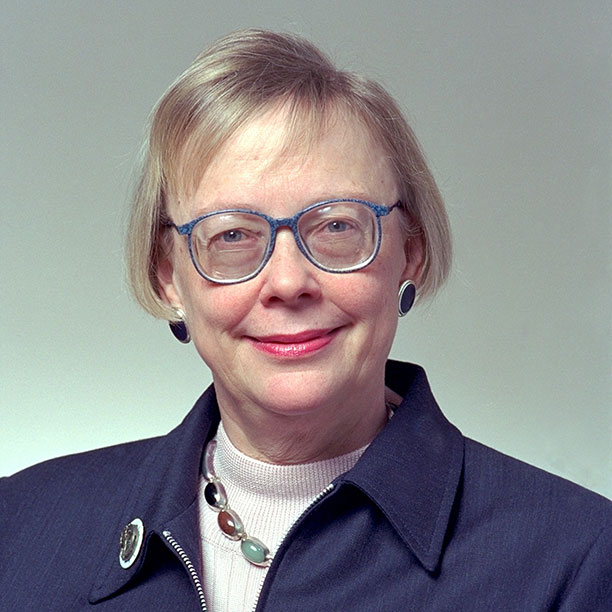Economist Elizabeth E. Bailey *72 Looks Back on a Pioneering Career
Before 1978, the federal government controlled airline ticket prices, routes, and companies’ entry into the market. Bailey helped develop the rationale for deregulating all of that. She served as commissioner for the U.S. Civil Aeronautics Board when the law she advocated for ushered in a free market for the airline industry. Suddenly, airlines could set their own fares — offering multiple price levels and discounts — and open new routes much more easily. With relaxed rules about passenger load, airlines have also enabled more people to fly per plane.
“It’s allowed an awful lot of people to travel who couldn’t have afforded to travel before,” says Bailey, who has retired to Virginia. “Consumers do much better if you can charge fewer dollars but fill up more seats.”
Bailey is “a woman who gets things done,” as Kirk Johnson once wrote in a New York Times profile. She was the first woman to earn a Ph.D. in economics from Princeton. She was the first female commissioner of the Civil Aeronautics Board, and later its first female vice-chairman. When she moved to Carnegie Mellon University, she became the first woman to be the dean of its Graduate School of Industrial Administration. When there wasn’t a place for her special-needs son to attend to elementary school, she got together with parents and teachers to found a school for children with learning disabilities in New Jersey.
Born in New York, Bailey received a bachelor’s degree in economics from Radcliffe College and then went to work for Bell Laboratories. Under her original employment contract at Bell Labs, she had no chance of getting support for a graduate degree, she remembers. She worked as a senior technical aid on an anti-missile missile program, calculating trajectories of flying weapons and their debris. Still, Bailey’s passion was economics. “You were teased into knowing that there was some really interesting work right around the corner that you could do, if only you weren’t a woman,” she recalls.
After the Civil Rights Act of 1964, more opportunities opened up for women at Bell Labs. The laboratory funded Bailey’s master’s studies in mathematics at Stevens Institute of Technology, which she finished in 1966, and then a Ph.D. at Princeton. While pursuing her doctorate, Bailey was raising two young children and commuting to campus from Red Bank, N.J. She saw going back to school as a way to invest in herself. Her adviser, William Baumol, who died earlier this year, also mentored Princeton economists Harold Shapiro *64, Burton Malkiel *64, and the late William Bowen *58.
The Princeton program taught Bailey analysis tools and techniques to answer questions she’d posed at Bell Labs — “a potpourri of clever ways to look at things that enabled me to make progress on the work I was doing,” she says. Armed with the degree in 1972, she helped start the economics research group at Bell Labs, which she chaired until 1977.
With Baumol, Bailey had worked on the theory of contestable markets — the idea that when there are no costs for entering or exiting a market, companies will behave competitively. In the real world, there are always some costs, but the theory offered a rationale for removing government controls. Today, for example, because the government no longer regulates airline ticket prices, low-cost airlines such as Spirit and JetBlue have emerged to compete with higher-fare carriers on the same routes, which in turn have developed a variety of pricing levels. Developing the theoretical framework for deregulation while moving ideas between Bell Labs, Princeton, and New York University was exciting for Bailey. “I would say that was my best work,” she says.
Bailey’s work on the Civil Aeronautics Board helped nix not just regulations of the airline industry but also the very agency to which she belonged — the Airline Deregulation Act of 1978 literally spelled out the Civil Aeronautics Board’s eventual demise.
Bailey continued working on regulatory issues when she became a professor at the University of Pennsylvania’s Wharton School of Business in 1991. While she still thinks economic deregulation has been successful in the airline industry, she adds that industries need other kinds of regulations for consumer protection or safety.
Today, Bailey is an emeritus professor at Wharton, a member of the board of the National Bureau of Economic Research, and an adviser to the Center for Economic Policy Research at Stanford. She occasionally visits Princeton, where her granddaughter Caroline Bailey ’20 is an undergraduate. “I’m sure it’s changed enormously, but it’s kept the feeling of what it had before,” the elder Bailey says of the University. “There’s a recognition when you go on campus, and a peacefulness that descends on you.”












No responses yet